Straight Line Newsletter
Sign up for news and updates from Straight Line. You’ll only get quality content you’d expect from us, and we'll never share your email for any reason.
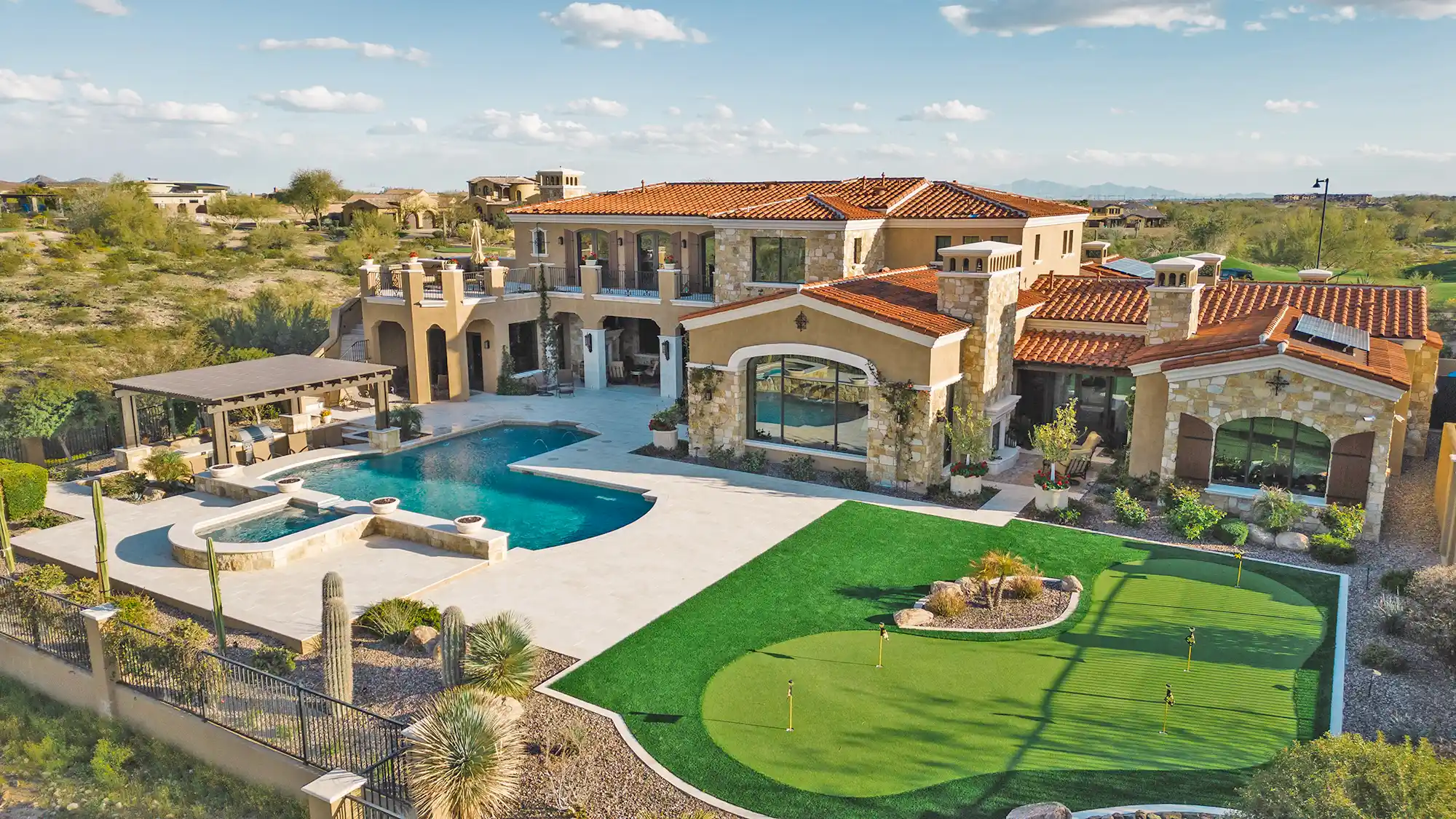
If there’s anything we’ve learned in the last few years, especially in the realm of 2024 landscaping trends, it’s that change is the only constant in life. A lot happened in such a short period—from unprecedented travel restrictions to social media’s explosion. Now, the “new normal” is underway.
Residential architecture is no different. For instance, the landscaping trends in Phoenix, Arizona reflect the residents’ growing affection for home improvements. We don’t do them anymore only to fix what’s broken. We also try to make our dwellings more fun while future-proofing their value.
This blog post discusses what kind of outdoor space upgrades are picking up steam in the Phoenix area and why.
Backyard renovation allows people to expand their living spaces. With the right revamp choices, you can make staying home feel more like a dream vacation than a chore. Phoenix residents can do that by building new outdoor structures that promote relaxation and interactions as in an indoor living room.
In landscaping, “hardscape” refers to the hard, non-living elements of the design. The hardscape divides the outdoor living space into three planes:
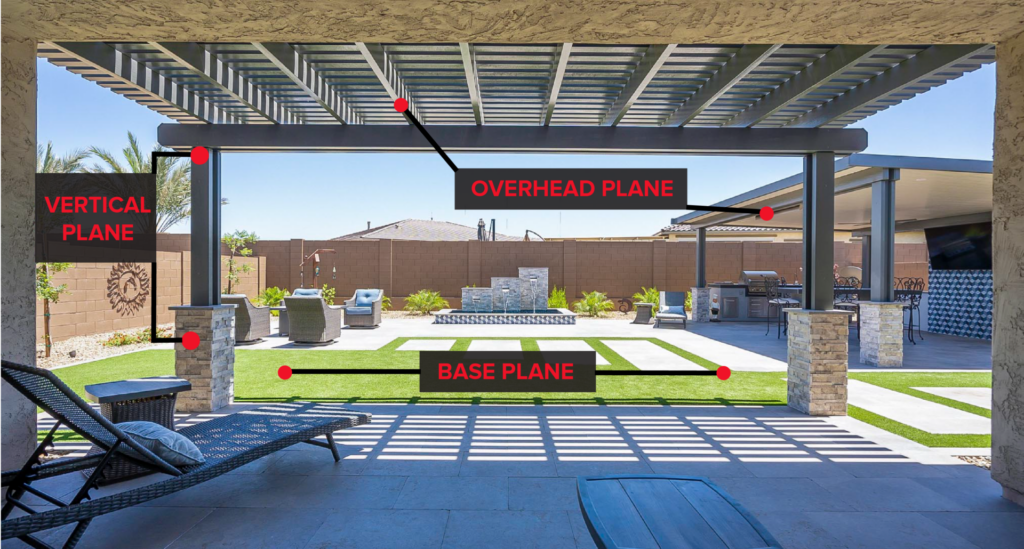
Presently, the following home improvements are making a splash in the metro:
An outdoor kitchen increases your cooking options and creates a unique dining experience. This home addition also raises Phoenix property resale prices significantly. Custom outdoor kitchens are especially popular because of their immense aesthetic, entertainment, and investment potential. Today’s trendsetting outdoor kitchen upgrades include gas grills, media walls, expanded storage spaces, and specialty outdoor appliances.
Gas grills have several advantages over types running on other fuel forms. For starters, these outdoor appliances are easy to use and maintain. Gas grills also work fast, letting you spend more time enjoying your outdoor living space. Although gas-grilled food is less smoky than wooden-grilled edibles, these appliances let you comply with Arizona’s environmental restrictions, which aim to improve air quality, especially during cold months.
A media wall is a shaded wall where you can install entertainment equipment. An outdoor-rated TV never goes out of style, and it is the most popular media wall appliance. You may add other electronic equipment to keep the mood light and fun while guests wait for their food.

Expanded storage areas let you take fewer trips to your indoor kitchen. That means greater efficiency and less likelihood of spills and accidents. You may integrate the dry storage areas with the countertops to maximize square footage.
For specialty outdoor appliances, our design team recommends the following for their functionality and aesthetic value:
Your outdoor kitchen can easily be everyone’s favorite area in your backyard. So, besides functional and aesthetic features, the design must also include fire safety.
Outdoor fireplaces have various possible uses and add great value to your home. Besides warming up Arizona desert yards on chilly nights, they can—
Outdoor fireplaces are versatile. In Arizona, gas fireplaces are preferred as they are easy to use, require little upkeep, and let homeowners comply with environmental regulations. Outdoor fireplaces are perfect for homes with big yards.
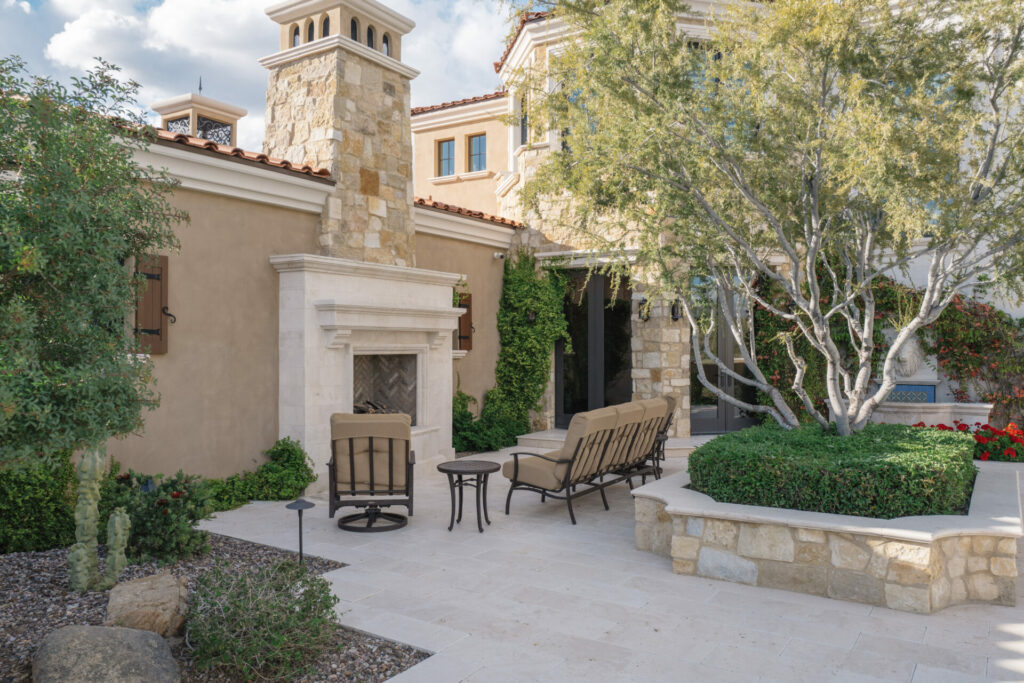
For small backyards, our design team recommends fire pits to leave more space for other fun amenities. Gas fire pits are preferred in Phoenix for their ease of use and aesthetic appeal. Upscale finishes and replaceable glass chips let you match the fire pit’s design with your home’s ambiance.
Combo fire and water features, such as fountains attached to fireplaces or fire pits, are also having a moment due to their stylishness.
In critical times like the present, people grow a greater fondness for the environment. The Phoenix homeowner is no different. That’s why wildlife-supporting water features like waterfalls have become key for 2024 landscaping trends. Waterfalls attract aerial life. The white noise they create can turn your city home into a tranquil haven.
Swimming pools are likewise fashionable. They provide much-needed recreation and physical activity to people staying home for long intervals. You can add fire features, shade structures, and water fountains to create a luxe, resort-style swimming pool.
Water features may look wasteful on the surface, but many modern ones are not. Primarily, there’s a shift toward water-efficient technology. Building pros now integrate water-recirculating or recycling equipment into water features. Some offer to attach a home rainwater collection system as an option.
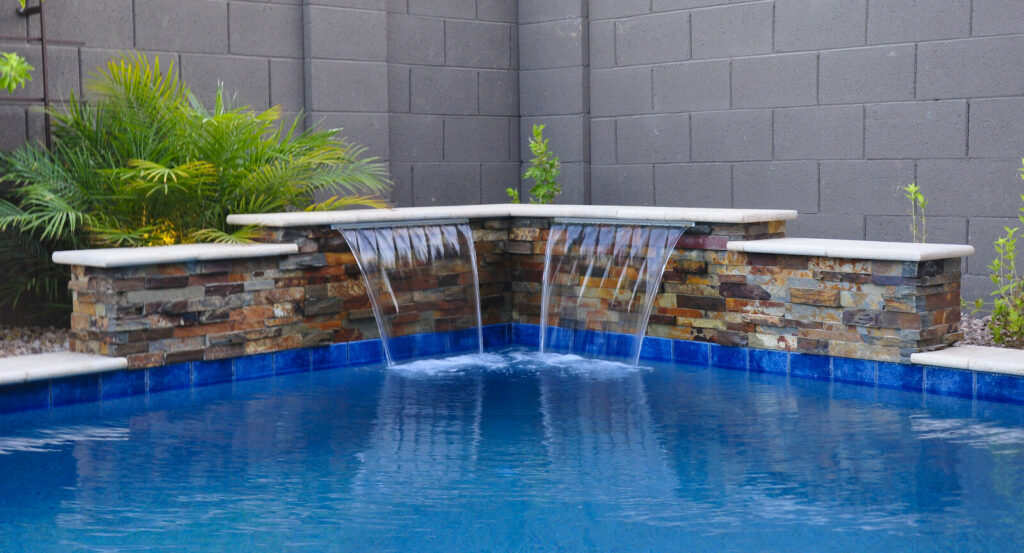
Strategic landscaping is another water-conserving innovation. The idea is to build your water feature in a cooler location—such as under a tree, in a garden, or near a shade structure—so evaporation occurs less. Using Zen designs in landscaping also helps limit water loss.
Desert landscaping is incomplete without these overhead protectors. Roofing structures like ramadas and pergolas lessen ambient heat and shield people, pets, and equipment from various elements. They ensure comfort 24/7 despite the weather’s unpredictability and the environmental changes, thus their popularity.
Some upsurging shade structure design ideas in Phoenix are the cantilevered pergola, poolside shade, and wood-insulated media walls and ceilings.
Compared to the traditional pergola, a cantilevered pergola may extend from the main house or a landscaping wall or stand alone, supported by fewer columns. Cantilevered pergolas fit easily in small yards. Aluminum and alumawood are popular materials for these shade structures.
Poolside shade structures are also gaining popularity fast in desert areas like Phoenix. Shade structures add style and limit heat and water evaporation. They also make a fun hangout after a swim.
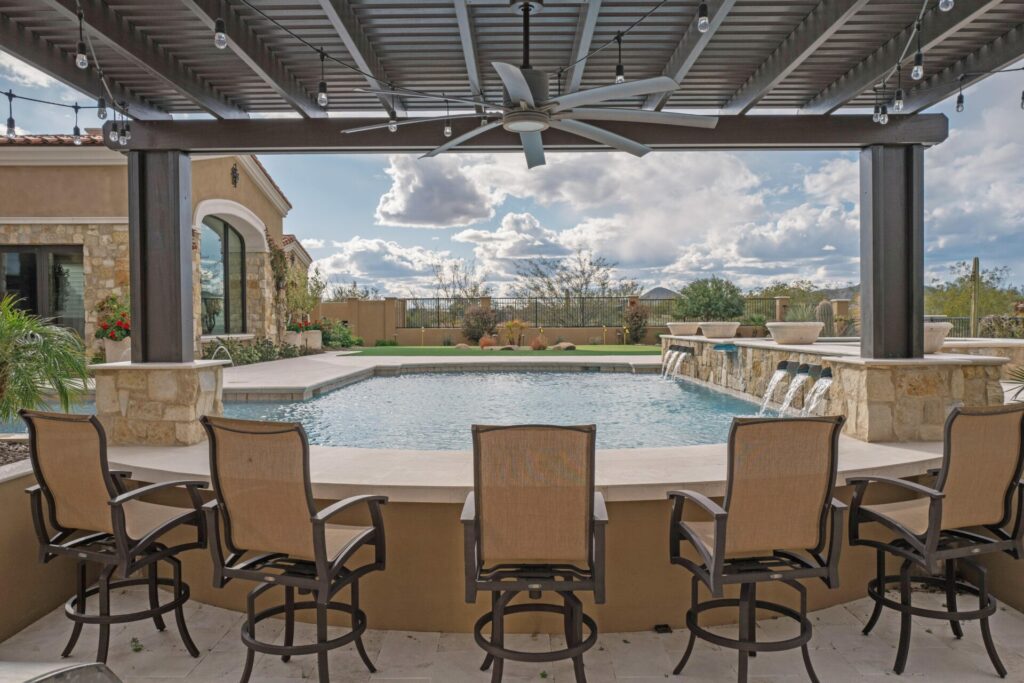
Wood is rarely used in hardscapes as it is less resistant to environmental agents. However, you can turn it into a media wall insulator, which can reduce the heat surrounding electronic equipment. Ramada ceilings are also best made of wood to cool the area inside this underventilated shade structure. Wood must be treated for greater longevity.
Offering serene retreats for solitude or social gatherings, decks and patios create spots where people can have quiet alone time or intimate conversations outdoors. Decks provide the best desert landscaping views, while patios make great locations for outdoor kitchens and fireplaces. Both can boost property value significantly.
Current deck and patio trends include shaded outdoor kitchens, brighter nighttime lighting, and resort-style outdoor spaces. Shaded outdoor kitchens are built-to-last, roofed deck or patio cooking areas. More lights in your backyard ensure nighttime safety, especially during summer evening parties.

Resort-style outdoor spaces have multiple amenities. Optimizing space—by choosing compact structures and expanding vertically more than horizontally—allows homeowners to create a backyard oasis amid a crowded city.
It’s okay not to have composite decking and automated shade structures. Composite decks are made of plastic, which can easily get hot in the desert. Automated shade structures, while impressive, raise costs without conferring significant advantages over traditional ones when used in a desert region.
“Softscape” refers to the soft parts of the landscape, notably artificial and natural plants. In Arizona, residents have widely embraced xeriscaping—essentially, the practice of drought-proofing a landscape—to adapt to the desert climate. Besides switching to a water-efficient irrigation system, the following have also become popular in Phoenix homes:
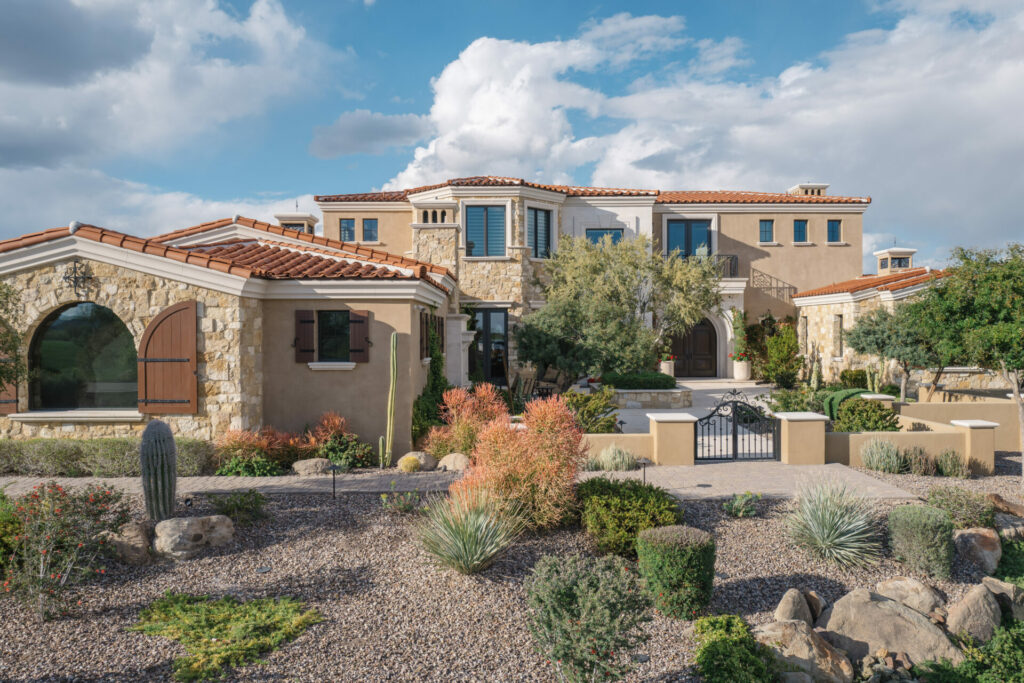
Native plants thrive in the desert climate better than non-native ones. Examples are colorful succulents like aloe vera and Christmas cactus. Additionally, these greens cool the surroundings, require little maintenance, and attract wildlife.
Phoenix incentivizes home water conservation, but many HOAs prefer real plants over artificial ones in the front yard. Drought-resistant native Arizona plants let you comply with regulations coming from both authorities. If you wish to stave off the desert heat in your backyard, planting desert-adapted greens in this part of your property is also a good idea.

A natural ground cover needs a regular water supply. Artificial plant material doesn’t. Many Arizona residents replace their natural backyard lawns with artificial grass. Doing so helps them keep up with local water-use regulations, fickle environmental conditions, and busy calendars.
Manufacturers classify artificial turf based on various characteristics, such as material, stitch count, and color. Some varieties are made specifically for foot traffic-heavy locations like putting greens and play areas. Talk to landscaping pros to find the best type for your yard.
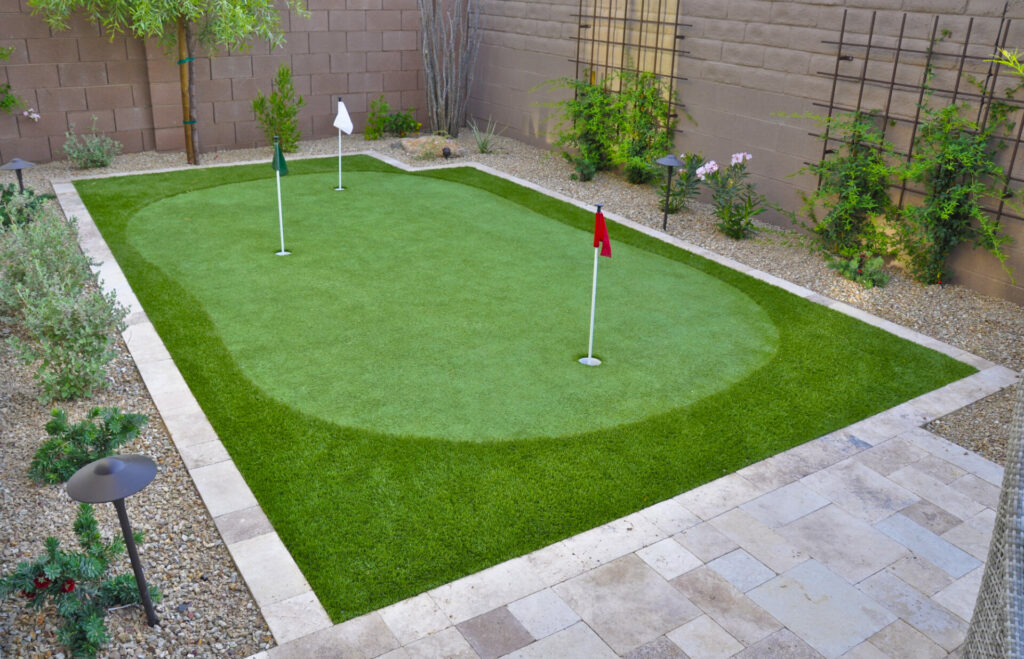
Phoenix homeowners may also choose to cultivate a small natural lawn and surround it with big chunks of hardscape. For people with nurturing souls, it beats avoiding natural grass entirely. If this is what you prefer to have in your yard, we recommend working with reputable landscaping professionals. Doing so helps ensure you get nothing less than an impeccable lawn design for your desert landscape.
Most natural grass lawns in Arizona have resilient species like Bermuda grass and St. Augustine grass. Other varieties are also available, but if you want natural grass on your property, pick climate-suitable types and give them enough TLC. You can read our previous post on choosing and caring for Arizona grass for more information.
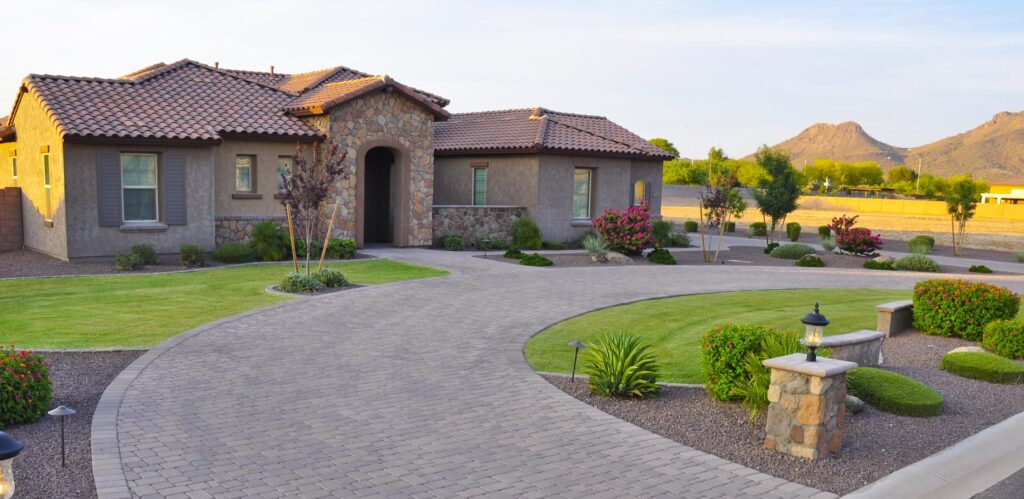
What can drought-resistant trees do that shorter desert plants can’t?
The answer: They provide shade.
Trees are important in Phoenix landscaping because they cool the surroundings better than ground cover plants. Thus, they help you reduce energy bills from air conditioning. Other benefits of tree planting include sheltering wildlife and keeping homeowners physically active.
Our landscaping team recommends planting more trees in both front and backyards over expanding hardscapes to enjoy the above benefits. Some varieties commonly found in Arizona homes are palo verde, desert willow, and many kinds of palm trees.
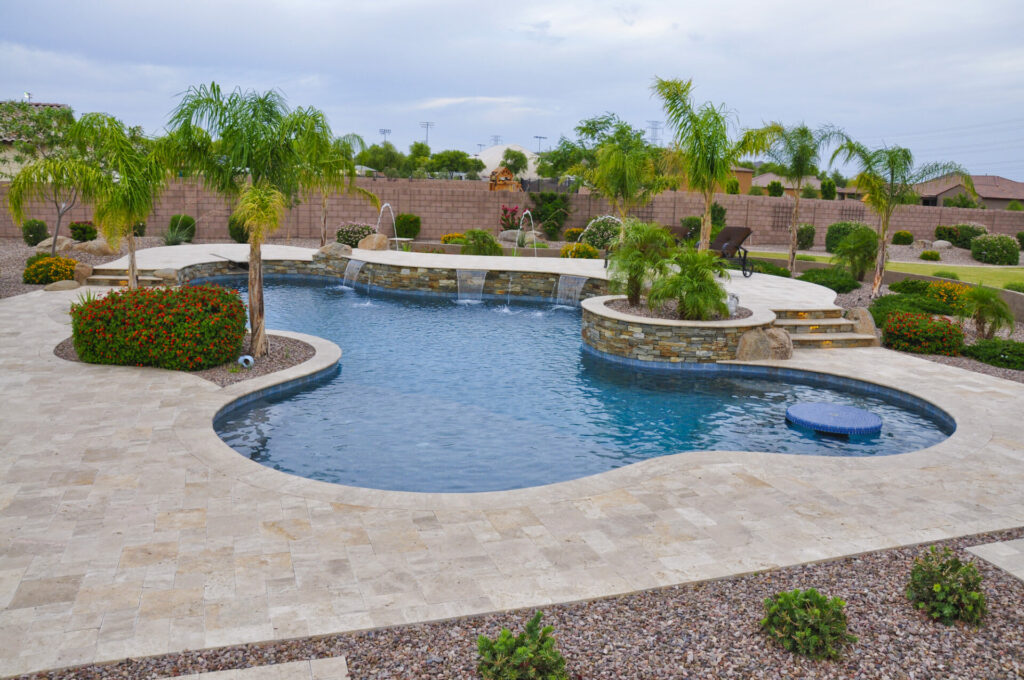
Gardening has become increasingly important in metropolitan areas, even desert regions like Phoenix. People create desert oases for various reasons. Many do it for recreation, physical activity, or simply to embellish the surroundings.
Lately, food security has also become a vital home gardening goal. Since not every Arizona yard has ample space or suitable soil, innovations like container gardening and vertical gardening have turned mainstream. Container gardening entails using pots, planters, and other containers for planting. Vertical gardens are raised gardens that may only be 4 feet wide. Carrots, leafy greens and tomatoes are some vegetables you can plant in your backyard.

Straight Line Landscape’s design team recommends incorporating smart technology in lighting and irrigation systems for people who love plants but don’t have enough time for maintenance. Lighting automation enhances nighttime security, while smart irrigation waters plants even when you cannot get to them on time. Automation in these parts of your property can make for a good investment.
If you wish to have your own garden, you may contact your local nursery for plant care information for specific varieties. Don’t forget to hire a professional landscaper to help you create a desert oasis that suits your home.
Now that you know what outdoor features are gaining traction locally, you may wonder how your neighbours put them together. In other words, what landscape design ideas are flourishing in Phoenix?
Over the last few years, Arizona home architecture has been shifting to one concept in particular: simplicity. Simple designs inspire inner peace and promote efficiency—just what you need to cope with drastic environmental and social changes. They also require little upkeep.
Simple art designs take on different names: minimalism, suprematism, Zen design, abstract art, constructivism, modular, and others. The patterns do not always represent nature, though they stay quietly in the background to let nature’s beauty pop up. The designs may have all the functions a homeowner wants but appear clean and easy to navigate.
So we see a lot of the following art elements in Phoenix landscaping these days:
Straight lines are modern-looking yet timeless. Angular strokes appeal to all generations. In terms of colors, white and gray are slowly being replaced by “greige.” As the name implies, this color that may be the biggest thing in 2024 is a mix of gray and beige, looking “taupey” and slightly warmer than its predecessors.
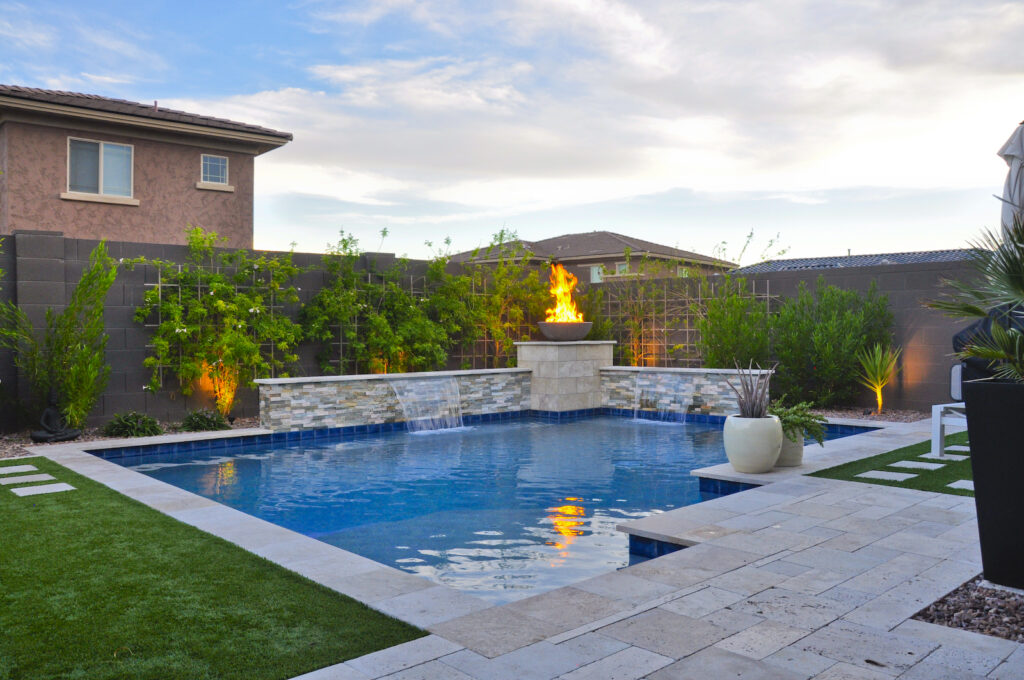
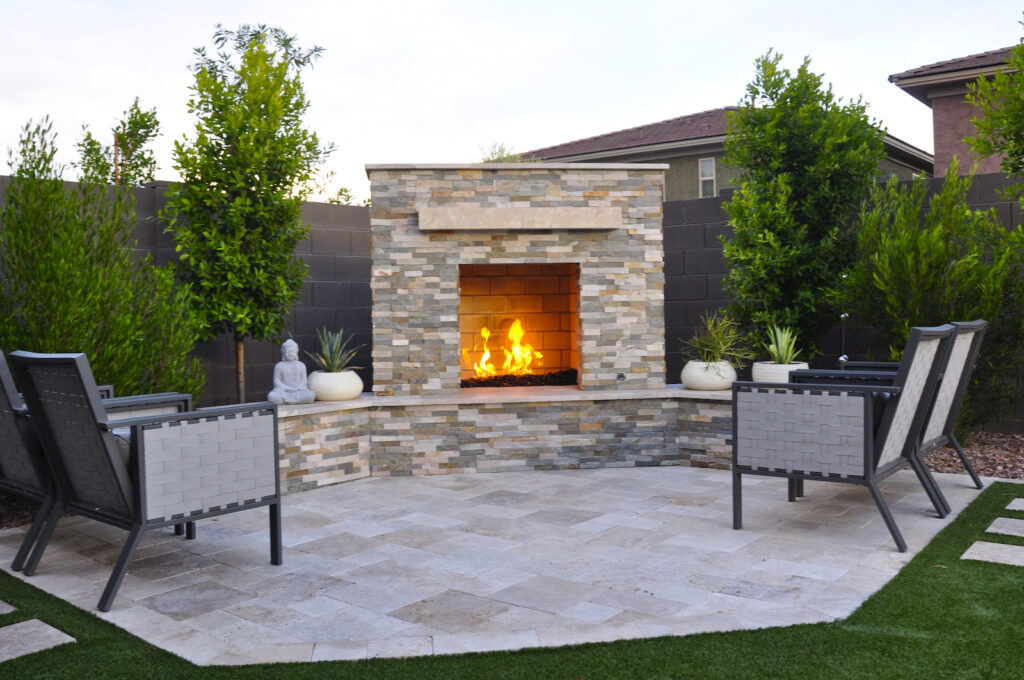
As for materials, the Straight Line Design team recommends the following:
Embracing the “less is more” principle doesn’t mean sacrificing personal expression. With the right design, you can have your desired outdoor features without the taxing maintenance or aesthetic chaos.
You probably noticed that these upgrades make modern Phoenix homes look very different from dated ones. Hardscapes used to be less complex, though most backyards had greater vegetation diversity. You may ask, what gave rise to the landscaping ideas currently on trend?
The most important factors are the following:
Arizona occasionally has rains, but the state’s water supply remains low. This is one of the biggest reasons for the local 2024 landscaping trends, especially since it impacts other environmental factors beyond human control.
Some Phoenix localities offer rebates to homeowners who reduce their water consumption. Outdoor irrigation can take up to 70% of residential water use. Local government and HOA water restrictions usually apply only to front yard landscaping, so the backyard is where people make more cuts.
Some examples of backyard renovations that can decrease water requirements are the following:
Note that when water requirements are low, maintenance costs are also low.
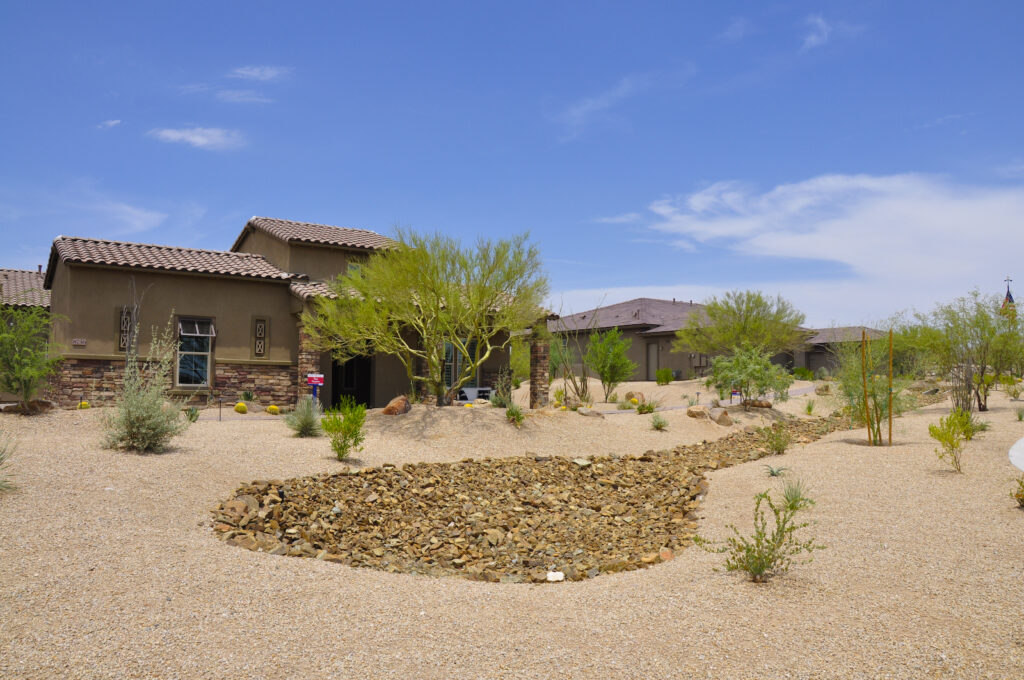
American metro areas like Phoenix create busy lifestyles. For young homeowners, a serene backyard is the perfect retreat from hectic workdays. For people near or in retirement, a minimalist but feature-packed outdoor space is ideal for family bonding. Both groups value the time-saving advantage of low-maintenance and easy-to-use outdoor equipment.
Drought and temperature extremes characterize the Arizona climate. Local governments and HOAs support home improvements protecting residents from these environmental conditions, such as the following:
Residents are aware of building regulations when making their backyard designs. However, as much as they want their homes to look unique, they’d rather their landscaping ideas aren’t too flashy. So, you could say that neighbors also influence each other’s preferences.
When social distancing was in force, social media enabled people to share ideas, even with little or no face-to-face contact. The COVID-19 pandemic created the need for more entertaining home activities, but it was the internet that fanned the flames. Chalk it up to people’s fear of missing out.
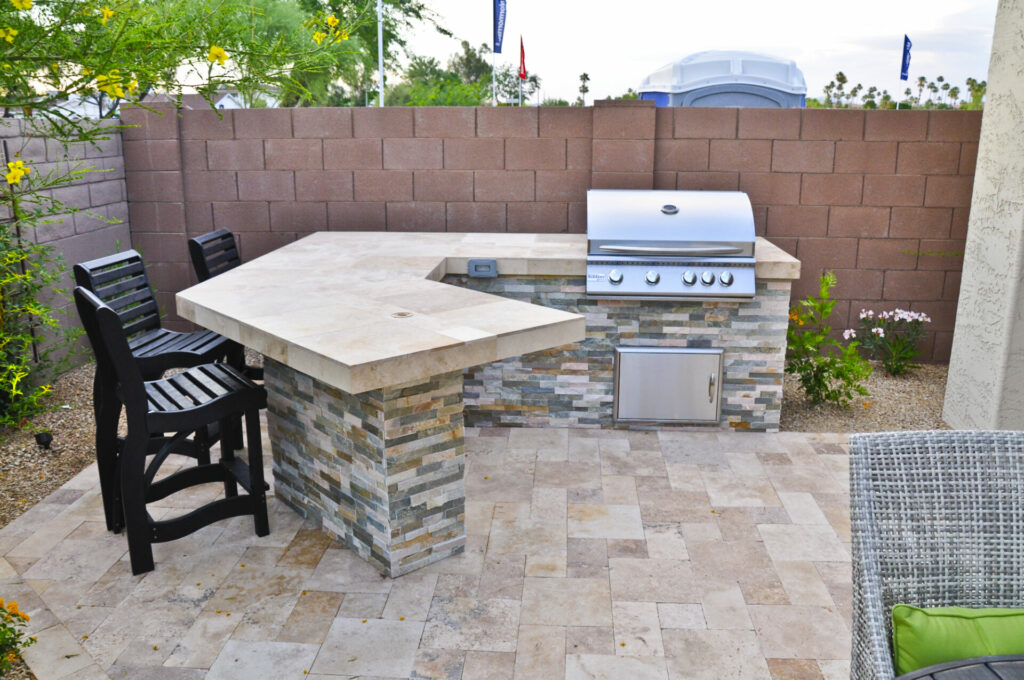
Some landscaping ideas that went viral online in the last few years are:
In Arizona, social media has also shaped the landscaping preferences of many residents. So the online perspectives are not far off from the real-life local ones, particularly when it comes to the 2024 landscaping trends.
The COVID-19 pandemic made people want to expand their living spaces, thus the surge in professional and DIY outdoor projects. Hardscape structures like outdoor kitchens and decks provided homes with more room for entertainment. Even if the public health situation is now improving, these upgrades aren’t expected to lose popularity soon—they’re just too enticing not to have.
Phoenix’s climate inspires people from various parts of the US to move or build a winter retreat here. However, desert daytime temperatures can reach scorching levels, and the changing Arizona climate doesn’t make things better. What does, however, is building a backyard shade structure like a ramada or pergola or planting native trees. The demand for overhead hardscape elements is expected to continue in the area, more out of necessity than sheer novelty.
Construction material costs continue to rise because the supply barely meets the demand. The pandemic made things worse by disrupting distribution chains. Adapting to these conditions means backyard landscape designs must be sustainable and practical without compromising aesthetic quality. So, when you think about it, material price and shortage also justify the current popularity of minimalism and low-maintenance structures.
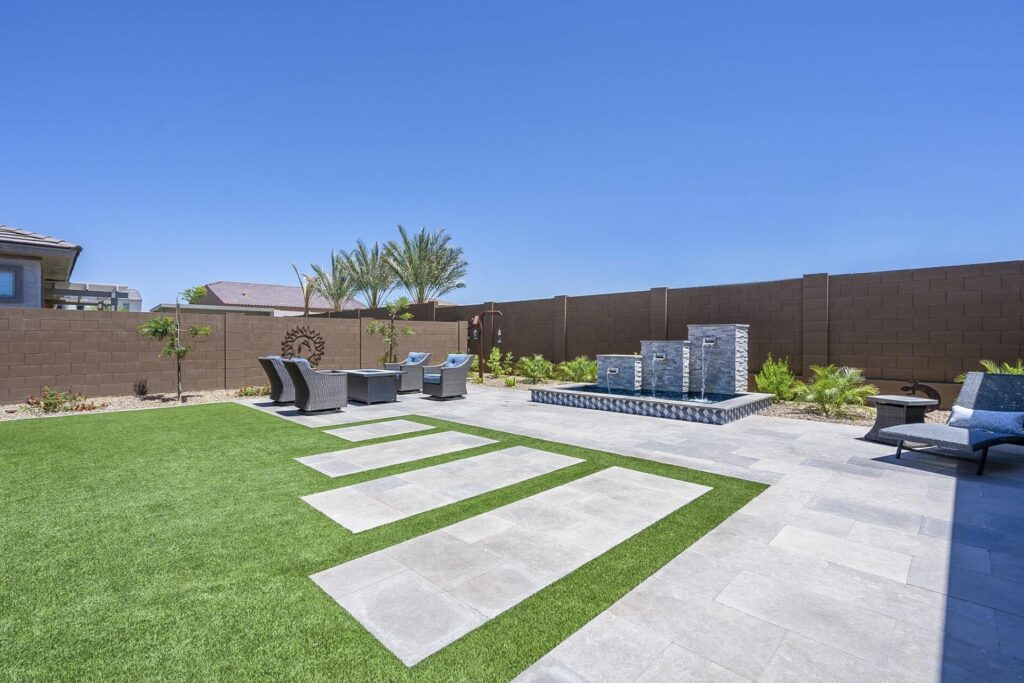
As you can see, these landscaping ideas didn’t surface on their own. They resulted from recent events that shaped global and local views. Keeping up with the trends is just as important as knowing how they came to be. After all, backyard designs must be both pleasant-looking and environmentally appropriate, especially in places like Phoenix, Arizona.
In summary, what you can expect to see in Phoenix landscaping this year are:
Feeling the landscaping pulse is a good way to start your project. Only by knowing can you make a sound design that’s also appropriate for the Arizona environment.
"The primary source of our business has been organic referrals — from the neighbors and friends of our customers who see the quality."
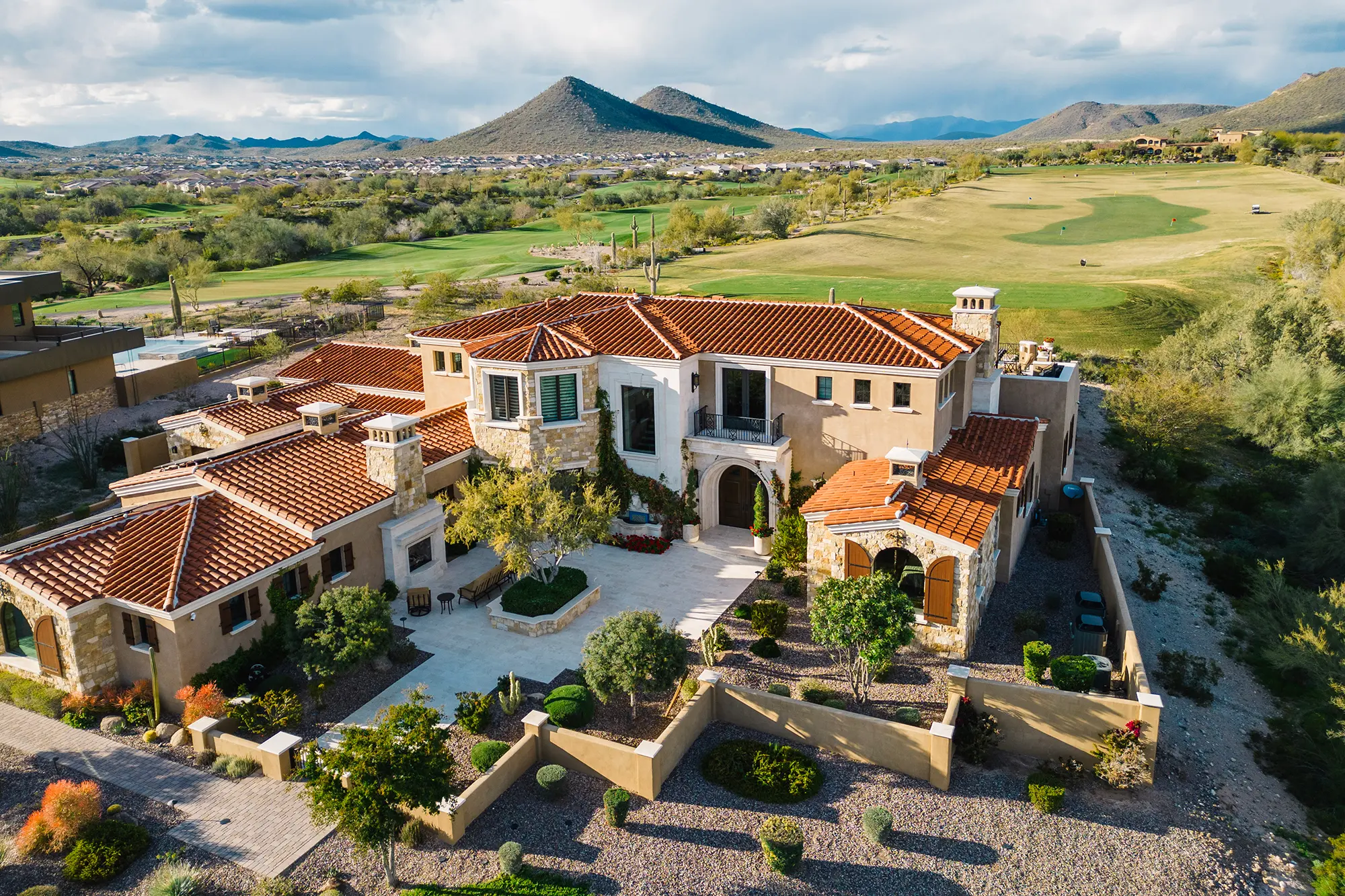
Start by asking for a quote, then we'll coordinate a time to meet at your property.